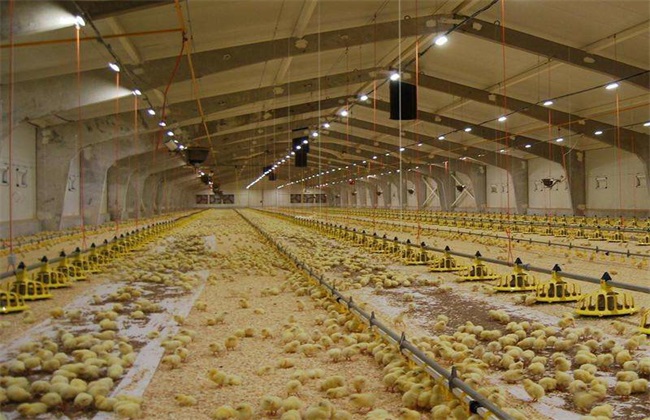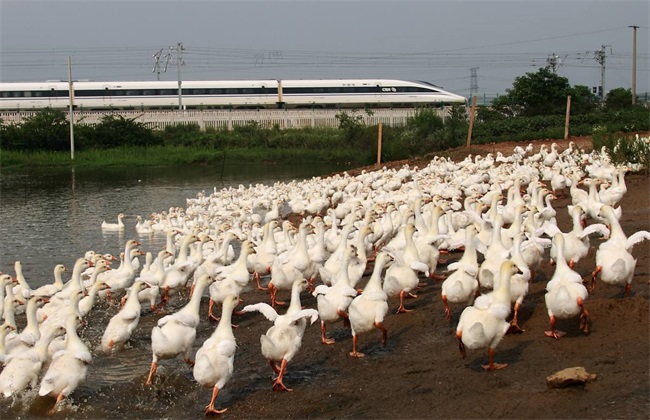Environmental factors causing stress in chickens
The development of chicken breeding industry in China is very mature, now there are more and more chicken varieties, breeding methods also emerge in endlessly. Coupled with consumers' love for chicken and eggs, the market demand for chicken is still very large. However, raising chickens is not as simple as we think. When raising chickens, chickens often suffer from stress because of the environment. So which environmental factors will cause chicken stress? Let's take a look at it with the editor.

1. Temperature
Under normal circumstances, the temperature is controlled at 20-22 degrees and the relative humidity is maintained at about 65%, which is the best temperature for chicken growth. In a suitable range of temperature and humidity, the growth rate and laying performance of chickens can be helped. If the climate temperature changes sharply in chicken farming, for example, the high temperature in summer is more than 30 degrees, the low temperature in winter is less than 5 degrees and the temperature difference between day and night is more than 10 degrees, it is very disadvantageous to the growth of chickens. High temperature will not only lead to stress reaction in chickens, but also reduce the sperm of Roosters, delay the time of sexual maturity of hens, reduce the fertilization rate and so on.
2. Lighting
Light is also very important for the growth of chickens. Reasonable light time and intensity is the key to ensure the healthy growth of chickens. In the process of chicken growth, if the light time is too long and too short, or if the light intensity of the soil changes, become stronger and weaker, it will lead to a greater response to stress. In particular, the impact on laying hens is greater, if layers are subjected to light stress, it will not only affect their own growth, the laying rate will also affect the decline, seriously affect the efficiency of breeding, so we must pay more attention.
3. Gas
When raising chickens, if the breeding density is too high, and the air circulation of the chicken house is poor, the ventilation is poor, and the chicken manure is accumulated and fermented again to produce a large amount of ammonia and other harmful gases. It will also cause serious harm to chickens. If chickens grow in an environment with high ammonia content for a long time, it will not only reduce the growth rate and laying rate of chickens. It will also affect the cardiovascular system of chickens, resulting in a variety of respiratory diseases and ascites and so on. Therefore, when we are breeding, we must pay attention to control the breeding density, regularly clean up chicken droppings, improve the permeability of the chicken house, do a good job of ventilation, discharge harmful gases, and improve air quality.
4. Noise
Under normal circumstances, chickens generally like to grow in a quieter environment. Chickens are very sensitive to sound, if there are abnormal sounds, sudden sounds or some continuous noise around the breeding environment, it will affect the normal growth of chickens. For example, firecrackers, shouting and so on, these noises are very disadvantageous to the growth of chickens. If the stress reaction caused by noise is light, it will increase the appetite and laying rate of the chicken, while if it is serious, it may lead to death. Therefore, we must keep the environment around the henhouse quiet and avoid noise stress.
The above is a brief introduction to the environmental factors that cause chicken stress. That's all for today's introduction. This article is for reference only. I hope it can help you all.
Related
- On the eggshell is a badge full of pride. British Poultry Egg Market and Consumer observation
- British study: 72% of Britons are willing to buy native eggs raised by insects
- Guidelines for friendly egg production revised the increase of space in chicken sheds can not be forced to change feathers and lay eggs.
- Risk of delay in customs clearance Australia suspends lobster exports to China
- Pig semen-the Vector of virus Transmission (4)
- Pig semen-the Vector of virus Transmission (3)
- Five common causes of difficult control of classical swine fever in clinic and their countermeasures
- Foot-and-mouth disease is the most effective way to prevent it!
- PED is the number one killer of piglets and has to be guarded against in autumn and winter.
- What is "yellow fat pig"? Have you ever heard the pig collector talk about "yellow fat pig"?



